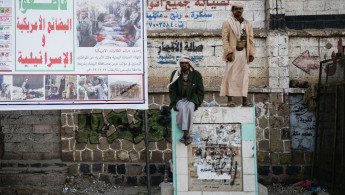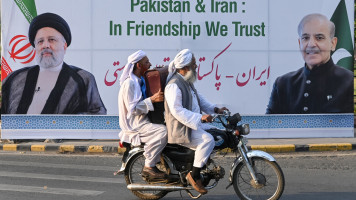Yemen's parties jostle for position in power vacuum
Yemen's future looked increasingly uncertain yesterday after a parliamentary session due to be held on Sunday was postponed.
The meeting was due to review the resignation of Abd Rabbuh Mansour Hadi, the Yemeni president who announced on Thursday that he would step down from his post.
Demonstrations and arrests
Following the Houthi takeover of government infrastructure last week, and the siege of the president's residence, Yemen has been thrown into chaos.
Demonstrators in the capital, Sanaa, who were protesting against the Houthi "coup" were attacked by the armed group and the rally violently dispersed.
Houthis arrested 11 protesters, including four women, close to Sanaa University.
On Sunday night, political parties including the Yemeni Socialist Party, the Yemeni Congregation for Reform, and the Nasserist Unionist People’s Organisation, announced that they would withdraw from discussions with the Houthis due to the arrest of the students, and a siege on ministers' homes.
The Socialist Party said that Houthis had refused to end the blockade on the home of Deputy Secretary-General Mohammad al-Mekhlafi and those of other cabinet members.
"What they are doing means that they do not want to reach a solution," a member of the party stated.
Power vacuum
The Joint Meeting Parties (JMP) held a series of meetings with the Houthis over the past two days to urge Hadi to retract his resignation.
"Positions vary on the retraction of Hadi's resignation," a JMP source told al-Araby al-Jadeed.
"The Socialist Party seems more enthusiastic about Hadi's return to power than the Congregation for Reform, while meetings between the JMP and the Houthis have been heavily criticised by activists, accusing the JMP of trying to save the Houthis, not Hadi."
| Yemen and the manufacture of sectarianism: Read Azmi Bishara's latest commentary here |
Several reasons seem to lie behind the postponement of Sunday's parliamentary session.
Southern separatist politicians had reportedly boycotted the session, while negotiations are believed to be taking part behind the scenes to form a military council.
Parliamentary deadlock
The General People's Congress (GPC), the party of former Yemeni President Ali Abdullah Saleh, has been busy mobilising its members for the session.
"Among the reasons too were the continuing efforts to reach an agreement with different political powers while Houthi militias besiege the parliament in Sanaa," a source said.
Sources say that a delegation of the GPC has been sent to Saada province, to persuade Abdul Malek al-Houthi, leader of the Houthi group, to accept Hadi's resignation.
Jamal bin Omar, the assistant UN secretary-general and special adviser on Yemen, is understood to be in Sanaa attempting to talk Hadi into retracting his resignation.
| The Houthis are now facing pressure on the streets, and in the corridors of power. |
Ruling party
Pressure from Houthis led to Hadi's departure, although many question whether this was the ultimate goal of the insurgent group.
The GPC has been the big winners in the ongoing crisis - which has led to a backlash among the Houthis.
The former ruling part has a majority in parliament and power in the country now lies, temporarily, in the hands of the parliament speaker Yehia al-Raei, a member of GPC.
The Houthis are now facing pressure on the streets, and in the corridors of power.
State visit
Raei has been leading a Yemeni delegation to Saudi Arabia for the funeral of the King Abdullah, who died last week.
During the visit, he met the new Saudi King Salman - which analysts take to be a sign that Riyadh may support the constitutional transition of power through the parliament.
The Yemeni delegation included leading figures of the GPC. The JMP was not present, and the group expressed their unhappiness at not being allowed to send its own representatives to Riyadh.
Tensions have ratcheted up further with the Houthi siege of a number of residences belonging to political figures in Sanaa, including Defence Minister General Mahmoud al-Subeihi.
End game
Media sources close to Hadi have said that Houthis have been pressuring Subeihi to head a military council that would run the country temporarily, but he has so far refused to do so.
Analysts say that the Houthis believe that forming a military or civilian council headed by a southerner may alleviate the tension in the south. Yemen's parliamentary speaker is also a northerner.
GPC sources told al-Araby that the party was strongly pushing for the deputy prime minister of the former government, Ahmed Obeid bin Dagher, and former prime minister Ali Mujawar - both southerners - to play leading roles in the next government.
This article is an edited translation from our Arabic edition.



